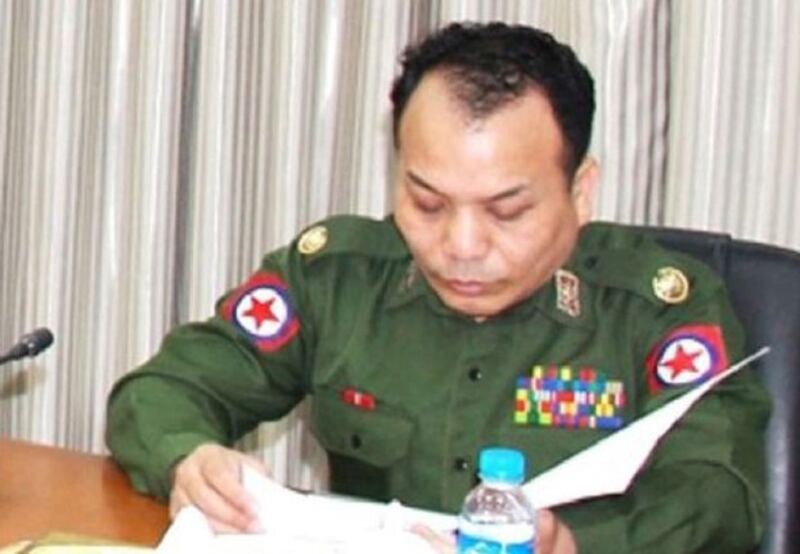Myanmar’s junta said it has sacked a high-ranking general for alleged bribery and corruption.
Lt. Gen. Moe Myint Tun, 55, was the seventh-highest leader in the State Administration Council, the governing junta. He had been sanctioned by the United States and other nations.
He was abruptly removed from his positions as chairman of the Myanmar Investment Commission, Foreign Exchange Supervisory Committee, and Central Committee on Ensuring the Smooth Flow of Trade and Goods, the regime said in a statement issued Monday.
Earlier this month, authorities arrested Moe Myint Tun, said to have accepted millions of dollars in bribes from businesspeople during the past two years, but it wasn’t clear if he would be tried.
He is under house arrest and being interrogated in the capital Naypyitaw, according to businesspeople who declined to be named for safety reasons.
His removal is part of a crackdown on trade and finance officials, businesspeople and exporters amid economic turmoil and sanctions as the junta struggles to accumulate foreign revenue and soaring commodity prices, sources say.
Lawyer Kyee Myint said that even if the top military generals were found to be corrupt, the junta’s top leader Snr. Gen. Min Aung Hlaing would not put them on trial, but only remove them from their positions.
“They will never admit that their members are corrupt,” he said. “That’s why their case will never get to the court. I don’t think they will be charged under any article of the law but just removed from their positions. They will remove these officials to make it appear that only a few of them were corrupt.”
Easy to exploit power
His chairman positions were given to Gen. Mya Tun Oo, another member of the State Administration Council. Moe Myint Tun had been appointed to those posts on Feb. 2, 2021, a day after the military seized control of the elected government in a coup d'état.
Legal experts and political analysts said the scandal shows that high-ranking military officers can easily exploit their posts, and that effective action should be taken against Moe Myint Tun if he is found guilty of bribery and corruption.

A retired brigadier general, who also spoke on condition of anonymity for safety reasons, said authorities should prosecute Moe Myint Tun according to military regulations if the allegations are true.
“Corruption should not occur at any level,” he said. “Since it is customary in our country for people to give gifts to show respect, it encourages corruption. They don’t happen to notice that they are committing corruption while showing respect like that.”
Several governments, including the United States, Canada, the United Kingdom and the European Union have imposed sanctions on Moe Myint Tun for his role in the military coup, the subsequent military and police repression of peaceful demonstrators, the killing of civilians, and the gravity of Myanmar’s human rights’ abuses.
The sanctions include the freezing of any assets in these countries, a ban on transactions with their citizens, and travel bans.
Another recent case
Earlier this month, the junta arrested another high-ranking military official — Gen. Yan Naung Soe, joint secretary of the Central Committee on Ensuring the Smooth Flow of Trade and Goods — amid the crackdown and an investigation of Commerce Ministry officials, the online news outlet Myanmar Now reported.
The committee is responsible for procuring U.S. dollars for trade licensing purposes and other commercial transactions.
Authorities arrested and interrogated him before Moe Myint Tun was fired. Afterwards, the junta summoned businesspeople from various sectors for questioning in Naypyitaw, said an import and export entrepreneur, who requested anonymity for security reasons.
The lieutenant general was sacked based on their testimony, he said.
Authorities also summoned former Interior Minister Lt. Gen. Soe Htut and Deputy Commerce Minister Nyunt Aung, according to Yangon-based businesspeople. RFA has yet to confirm this information.
Moe Myint Tun, Yan Naung Soe and Nyunt Aung have allegedly made millions of dollars from their dealings with traders and by benefiting from the disparity between Myanmar's official exchange rate of 2,100 kyats to the U.S. dollar and the market rate amid a steep decline in the kyat's value, Myanmar now reported on Thursday.
Worsening corruption
Nay Phone Latt, spokesman for the Prime Minister’s Office of shadow National Unity Government – made up of former civilian leaders and anti-junta activists – said corruption among top military officials has been common for decades and has grown worse under the ruling junta.
“Military rulers in our country have always worked for their own self-interest and the interest of their families, causing public poverty,” he said. “Lately, we’ve seen such corruption becoming worse.”
Junta spokesman Maj. Gen. Zaw Min Tun did not respond to calls for comment.
Thein Tun Oo, executive director of the pro-military Thayninga Institute for Strategic Studies, said he did not know the reason for Moe Myint Tun’s removal, and that there was a lot of speculation concerning frequent position changes of top military leaders.
There were only two or three changes in the positions of top military leaders under the State Law and Order Restoration Council (1988-97) or the State Peace and Development Council (1997-2011), two previous military juntas that ruled Myanmar, he said.
Translated by Myo Min Aung for RFA Burmese. Edited by Roseanne Gerin and Malcolm Foster.
